The Great Democratic Winnowing Appears To Be Imminent
Democratic voters and donors appear to be narrowing their choices for a nominee down, which could mean a short future for a lot of current Democratic candidates.
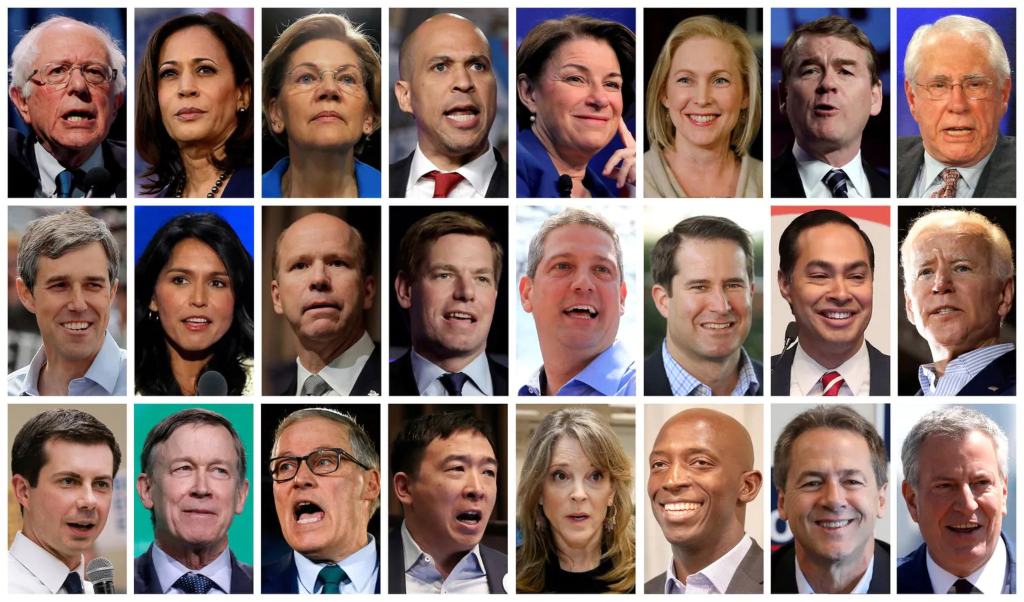
As we the clock ticks down to the next Democratic debate at the end of this month, it is becoming apparent that the historically massive Democratic field is starting to break down to a story about the frontrunners and, well, everybody else:
The top tier of the Democratic presidential primary is now reshaped around five candidates. The latest fundraising numbers prove it.
Joe Biden, Pete Buttigieg, Kamala Harris, Bernie Sanders and Elizabeth Warren raised about $100 million in the last three months combined. Together, they share a large majority of the public support.
They were already spending millions of dollars more than many lower-polling contenders have even raised. Now, in a powerful compounding effect for their campaigns, these top tier candidates are poised to plow that new money back into their field and digital operations — further reinforcing their fundraising and organizing advantages in the 23-candidate field.
It’s too early to be an inflection point, but late enough that the rest of the field needs to start worrying.
“The front-runners are pulling away, absent a blunder,” said Bob Mulholland, a Democratic National Committee member from California.
“It’s like any season as you get closer, some teams are headed to the World Series or the Super Bowl … The difference between winning and losing is pretty severe.”
The consolidation of Democratic money in the primary — and the now-flattened top tier — became evident this week, after Warren, the Massachusetts senator, announced Monday that she raised a $19.1 million in the second quarter. Buttigieg raised $25 million, Biden raised $21.5 million, Sanders raised $18 million and Harris raised $12 million.
That money is not just a benchmark. Buttigieg, while raising his staggering sum, began hiring dozens of organizers in Iowa and New Hampshire and plans to have 300 people on staff by Labor Day. Warren added more than 100 staffers in the past three months and already has more than 300 in total.
Harris in recent weeks has dramatically expanded her operation in the four early-nominating states, with more than 65 staffers in Iowa, 49 in South Carolina, 35 in Nevada and 30 in New Hampshire.
While lower-polling candidates are still struggling justto qualify for upcoming presidential debates, candidates with money can now return to their expanding donor lists for repeat contributions. By late summer, they are expected to begin reserving time for TV advertisements in selectearly primary states.
For every candidate outside of the top tier, “From this point forward, it gets harder for all of them,” said Doug Herman, a Democratic strategist. “Because if you’re at the bottom of the pile and you’re punching up for donors, trying to move polling numbers or obtaining traction with a viral moment and you haven’t been able to do it so far, what makes somebody think they can do it when people are starting to consolidate around the top five?”
Democratic voters, Herman said, are “starting to rule people out. They’re not consolidating, but they’re narrowing it to five or six. They’re starting to figure out who they’re not for.”
The same five front-runners are pulling more than 80 percent of the Democratic electorate’s support nationally, according to the most recent Morning Consult poll. And while many voters have yet to settle on a single candidate, voters’ second choice candidates tend to draw from the same group of contenders.
Along the same lines, Nathaniel Rakich at FiveThirtyEight notes that ‘lanes’ are starting to emerge in the race for the Democratic nomination that are likely to shape how the race is perceived and covered in the coming weeks and months:
In the wake of June’s Democratic presidential debate, most polling agrees that former Vice President Joe Biden is still the front-runner (although the size of his lead has taken a hit), followed by a rough three-way tie among Sens. Kamala Harris, Bernie Sanders and Elizabeth Warren. But as we already have seen numerous times this primary season, the standings are fluid. Many voters probably will change their minds between now and when voting begins. So it’s also valuable to take note of whom people’s secondchoices are.
When I first took a look at second-choice polling in February, there was little sign that the race was breaking down into “lanes” — a way of thinking about crowded primary fields that says smaller groupings of candidates are fighting over specific voting blocs within the party, such as progressive voters or black voters. Candidates like Biden and Sanders who dominated overall were also voters’ most popular second choices, no matter who their first choice was.
Rakich goes on to look at the results of three recent polls that asked Democratic voters for the first and second choices in the race for the nomination, and all three of them clearly seem to show that voters are already starting to narrow down the field in their head:
- For example, a recent Reuters Ipsos poll found that Joe Biden was the first choice of 22% of respondents, followed by 16% for Sanders, 10% for Harris, and Warren at 9%. In the polling for second choice, Biden stood at 15%, Sanders and Warren were tied at 14%, and Harris was at 11%. Further down the field, Pete Buttigieg was at 5%, Cory Booker and Beto O’Rourke were tied at 4%, Julian Castro and Amy Klobuchar were tied at 3%, and Kirsten Gillibrand was at 2%. All the other candidate were below 2%, which many registered 0% second-choice support;
- Another poll from ABC News and The Washington Post showed similar results, but only the sample size for Biden as a first-choice candidate was reliable enough to get a second-choice measure. Among those Biden supporters, though, ” 37 percent of people who said Biden was their first choice picked Sanders as their second choice, 17 percent picked Harris and 14 percent picked Warren.”;
- Finally, the latest Morning Consult poll showed Vice-President Biden getting the first-choice support of 31% of respondents, followed by 19% for Sanders, 14% for Harris, and 13% for Warren. For second choice, the candidates break down like this:
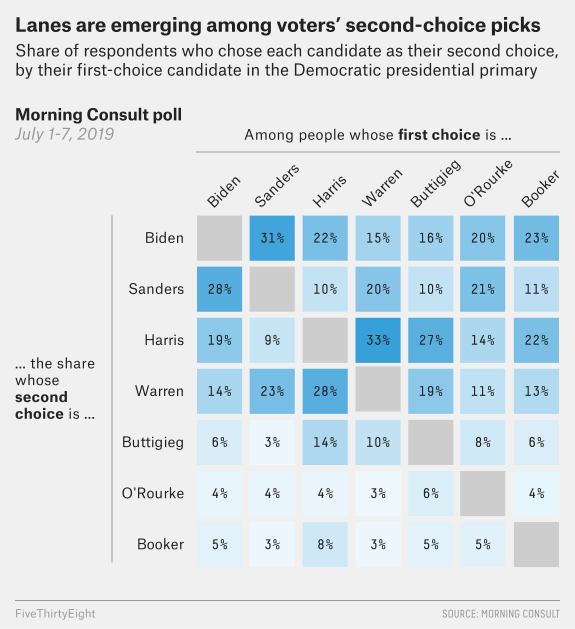
Rakich has several caveats to keep in mind, which are well worth reading at the link. However, what we can tell from this data is that, at least for the moment, Democrats appear to be breaking the race down to about five or six viable candidates that are dominating both the polls and the fundraising and “the others,” most of whom are in single digits with increasingly dim hopes of breaking out to challenge the top group.
This is also reflected in the most recent polling and in the polling averages, both of which are showing that while the nature of the race has changed significantly from where it was before the debate, the identity of the candidates at or near the top of the polls remains the same.
For example, in the most recent poll from The Economist and YouGov (Margin of Error +/- 3.3%), we see the following:
- Joe Biden stands in first place at 22%, unchanged from his position in the previous YouGov poll;
- Elizabeth Warren is in second place at 18%, down one point from the previous poll;
- Kamala Harris is in third place with 15%, unchanged from the last poll;
- Bernie Sanders is in fourth place at 12%, up three points from the last poll;
- Pete Buttigieg is in fifth place at 6%, down two points from the last poll;
- Tulsi Gabbard is in sixth place at 3%, up two points from the last poll. This is the first national poll to show Gabbard above 2%;
- Cory Booker and Julian Castro are tied for seventh at 2%, this is unchanged for Booker and an increase of one point for Castro;
- All other candidates are below 2%, including Beto O’Rourke who was previously above 2%.
The numbers from the latest Emerson College poll are different, but still place the same candidates in roughly the same positions;
- Joe Biden is in first place at 30%, down four points from the previous Emerson poll;
- Senators Sanders, Warren, and Harris are all tied at 15%, representing a drop of twelve points for Sanders, an increase of one point for Warren, and an increase of eight points for Harris;
- Pete Buttigieg is in third place at 5%, a decrease of one point from the last poll;
- Beto O’Rourke is in fourth place at 4%, an increase of three points from the last poll;
- Andrew Yang is in fifth place at 3%, an increase of two points from the last poll and the first time that Yang has polled above 2% in a national poll;
- Cory Booker and Tulsi Gabbard are tied for sixth at 2%, a decrease of one point for Booker and an increase of one point for Gabbard; and,
- All other candidates are below 2%,
And here’s how things look in the RealClearPolitics Average:
- Former Vice-President Biden remains in first place at 27.1%, giving him an average lead of 11.8 points;
- Senator Bernie Sanders, despite his recent dips, remains at second place with 15.3%;
- Senator Kamala Harris is in third place at 15.0%;
- Senator Elizabeth Warren is in fourth place at 13.7%;
- Mayor Pete Buttigieg is in fifth place at 5.0%;
- Former Congressman Beto O’Rourke is in sixth place at 2.6%;
- Senator Cory Book is in seventh place at 2.0%; and,
- All other candidates are below 2%
The RCP chart, meanwhile, shows that Vice-President Biden’s post-debate slide may be leveling off, while the back of Senators immediately behind him fight with each other for the title of top challenger:
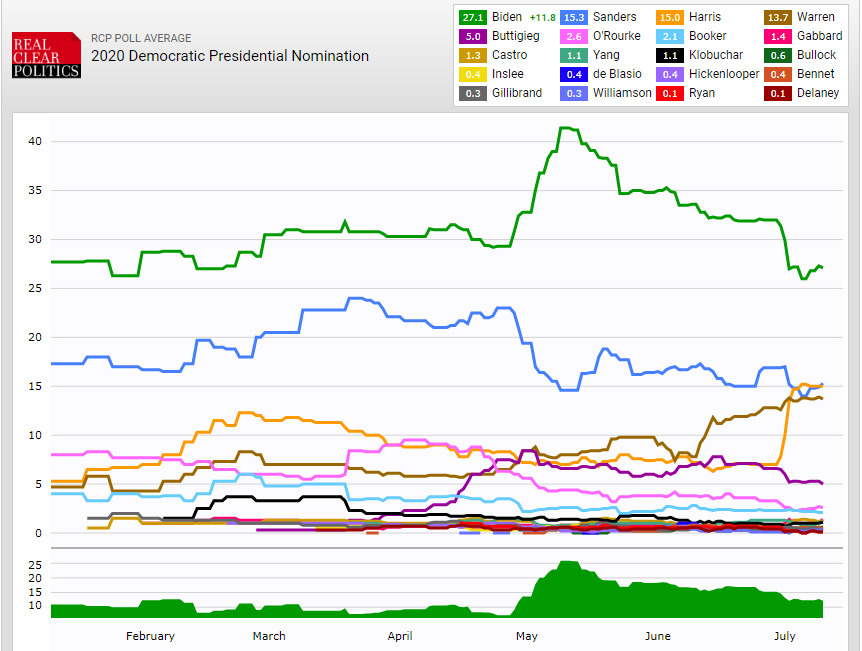
While all of the usual caveats remain in place regarding early polling, what all this data shows us is a race that, at least for now, appears to be undergoing an early winnowing and that we can say three things about the state of the race right now:
- Candidates such as Biden, Warren, Harris, Sanders, and Buttigieg appear to be more or less solid in their positions in the top five of the field.
- After that, we’ve got a mid-to-low tier of candidates, most of whom are averaging at or near 2% in the polls, that includes Cory Booker along with other candidates such as Beto O’Rourke, Amy Klobuchar, Andrew Yang, and, oddly enough, Tulsi Gabbard. The fact that these candidates have either risen or stayed above the 2% level, which suggests that they could rise higher if they’re able to take advantage of the situation that develops in the near future.
- The rest of the field, which is averaging below 2% and in many cases includes roughly 14 other candidates who are arguably nearing the point where they probably ought to consider whether it’s worthwhile to even continue maintaining a campaign going forward. Some, but not all, of them will qualify for the next debate
All of this can change, of course, but the further we go on the more set in stone these lanes are likely to get.

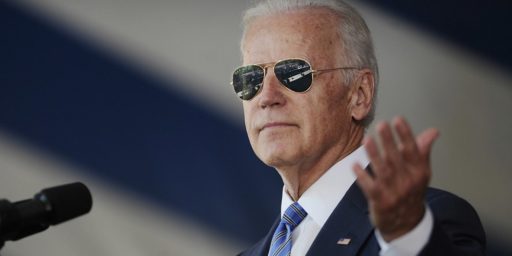
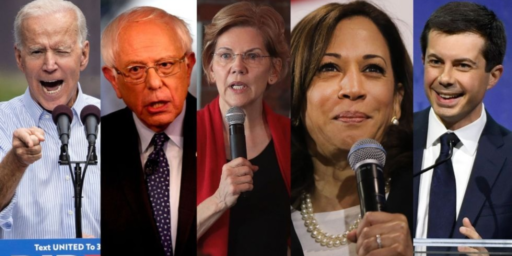
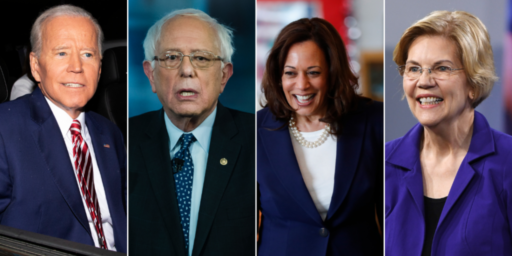
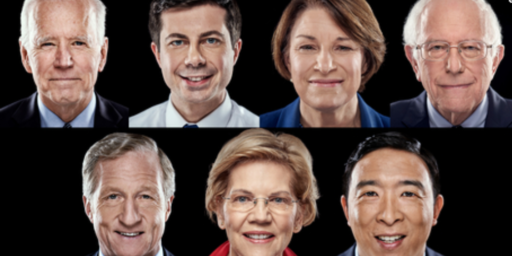
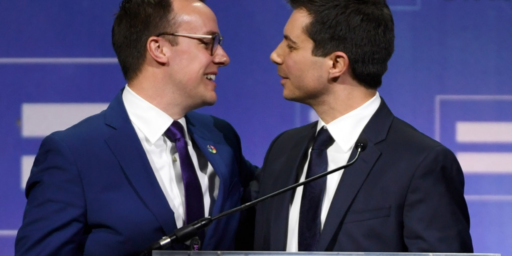
1. Biden
2. Harris
It’s gonna be Biden/Harris.
@EddieInCA:
I’m not absolutely sure of that at this point as I could see Warren or Harris making tremendous inroads in a much narrowed field. But it’s Biden’s race to lose and Harris makes much more sense than Warren as a running mate.
Just eyeballing for now, but at a glance Harris followed by Warren seem to be in the lead for second choice votes.
In the 1st/2nd choice chart one anomaly stands out. Sanders people really don’t like Harris. I wonder why? (I’m not being sarcastic here. Despite my dislike of Bernie and his Bros I thought his tactics against her were too inside-baseball to have much affect on such a wide.) Is he getting the racist/misogynist-progressive Dem vote and is that a bigger demographic than I suspect?
It’s gonna be Warren/some dude 🙂
@Teve:
I think Warren at the top of the ticket would result in losing 30+ states. And I say that as a Warren fan.
I’d like to see Warren as Treasury Secretary or Commerce Secretary.
@EddieInCA:
Or Attorney General.
Second choice weirdly seems like replacing the candidate with the demographically closest candidate in the same tier, rather than anything about policy. Biden and Bernie are each the others second choice, same with Warren and Harris.
You could make a case that it’s name recognition for Biden and Bernie, and that as soon as people learn of other candidates they reject both Biden and Bernie (seems implausible), or this is straight up identity politics (some voters want an old white guy, others want a woman). Or something else.
I have no idea what it means. But it looks really meaningful.
@EddieInCA:
I think you’re wrong, but regardless, we’ll get to see one way or the other in 481 days. 😛
@Gustopher:
I have been having second thoughts on that, I think it’s easy to overanalyse , overthink, overinterpret data that means less than it appears. Better to just watch the process play out.
@Gustopher:
Yes. It’s rather weird because you’d think Warren/Sanders would be paired if it’s about policy. It’s not about policy.
I immediately noticed the same thing as most of the rest of you. If it is purely about political lane, there’s no way Biden and Sanders are replacements for each other. Warren, Harris, and Buttigieg also don’t feel like policy replacements for each other. And yet, they do seem to form two distinct groupings of mutual support within the second-choice question.
@EddieInCA:
I don’t want to see Warren in the cabinet. She’s got plans, so if she is not going to be POTUS, she should stay in the Legislative branch and not come into the Executive.
Unless the Dems win the Senate back, none of her plans can become law. I’d rather have her in the Cabinet, where she can actually affect policy without the interference of Mitch McConnell.
But that’s just my two cents worth….
If Dems don’t win back the Senate, NO Democratic POTUS is going to deliver laws that would meet the left’s objectives. Affect on policy through Department actions would be modest at best. This is why I believe the 2020 election can’t be a referendum on Trump, but must be an all out assault on what Republicanism has been over the last 10 years.
Now I don’t believe the Senate is out of reach for Democrats. But, if it became clear to Democrats that the White House could be won while the Senate would be lost, then the Dems would do best to elect Kamala Harris. She wouldn’t get us a liberal agenda, but she could be very effective going after Republican corruption. I personally see a President Harris scenario as the most likely situation where we’d see The Donald being indicted for crimes.
FTFY.
I’m a fan of Mayor Pete, but these numbers really look more like a top 4, with him being first among the outsiders.
@Ignatius J. Reilly: I agree, but I think the fact that he outraised everyone else means something too. He has the resources to potentially catch up.
@Doug Mataconis: From ThinkProgress: Perhaps the most disturbing detail of Harris’s record, however, hasn’t gotten as much attention. As The New York Times outlined in January, California’s former top lawyer has a history of defending wrongful convictions.
In 2015, according to the Times report, Harris’s prosecutors likely could have freed George Gage, a man who was charged with sexually abusing his stepdaughter. Gage was convicted largely on the basis of his stepdaughter’s testimony, despite the fact that his stepdaughter’s mother described her child as a “pathological liar,” and the fact that Gage was forced to act as his own lawyer. Harris sent the case to mediation and refused dismiss it. Gage remains in prison.
Similarly, as the Times reported, Harris worked to keep another man, Daniel Larsen, in prison for possession of a concealed weapon even though there was compelling evidence of his innocence, arguing that he failed to raise his arguments in a timely fashion.
Harris also defended Johnny Baca’s murder conviction, even though a judge found that a prosecutor presented false testimony during the trial. Harris later “fought tooth and nail,” as Ninth Circuit Judge William Fletcher put it to The Press-Enterprise, to keep the transcript that proved the false testimony out of the court’s hands.
Your kind of lawyer for Attorney General, eh Doug?
@EddieInCA:
After the party debacle over the inevitable candidacy of Hillary Clinton I’m not sure Democrats are looking forward to a preliminary coronation of Joe Biden. It seems to me to be a sure way to reduce turnout among constituencies that were motivated to get out the vote in 2018.
Also, Joe is so clunky out on the campaign trail, and makes so many unforced errors, that even though he’s likable, I’m not sure he survives the grind. Vice-President was the perfect gig for Joe.